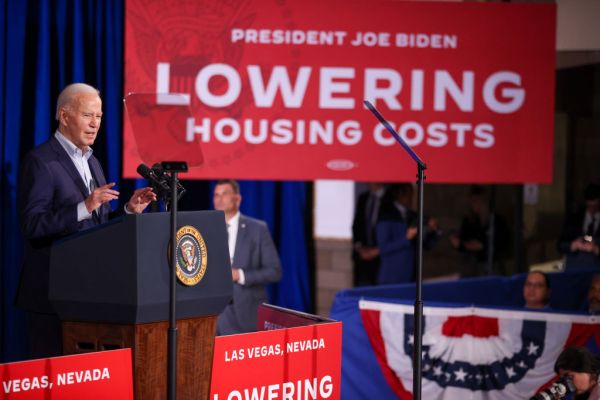From our Democratic friends, the shout arises as though in a single voice:
“There is no inflation problem for Joe Biden!”
That’s a different argument from, say, claims that Republican critics are opportunistically exaggerating Biden’s inflation problem. Consider the curious case of Zachary D. Carter, writing in Slate, which, as we all know, employs lab monkeys escaped from federal cocaine experiments as fact-checkers. Sneering at a Washington Post editorial on inflation as “preposterous,” Carter (and the guy who is in denial about inflation had to be named “Carter,” didn’t he?) insists that the United States currently has lower inflation “than any nation in the G7.”
The problem, as with much of what you read in Slate, is that this is not true. I might be wrong—but I don’t think the OECD and the IMF probably are.
The IMF World Economic Outlook report of April 2024 puts the U.S. inflation rate at 2.9 percent year-over-year—ahead of every other G7 nation except the United Kingdom. Current OECD numbers have the U.S. at 3.36 percent inflation as of April—ahead of every other G7 country. In January, another OECD report on inflation found much the same thing: that U.S. inflation exceeded that of any other G7 country save the United Kingdom. You can make a pretty good case that the United States is outperforming many of its peers on many other measures, as Carter does, but inflation in the United States has been a smidge higher than it has been in, say, Japan (2.2 percent) and Italy (1.7 percent).
(Different reports use different models for estimates, so you’ll get different numbers in the IMF, OECD, and U.S. government reports. What matters is that you’re comparing apples to apples rather than using wildly different models for different countries.)
The Bureau of Labor Statistics figures put our inflation rate at 3.4 percent as of April, substantially higher than the Federal Reserve’s preferred 2 percent target. And that’s 3.4 percent inflation of prices that already have seen big-time inflation for several years now. In simplest terms, think of it this way: 3.4 percent inflation of a $200 recurring expense is $6.80 per, whereas 5 percent inflation of a $100 recurring expense is only $5 per. Moving up the baseline makes a big difference. The question of rate is distinct from the question of bottom-line expense. Even for people whose wages are increasing faster than prices are, more money out-of-pocket is ... more money out-of-pocket. You don’t need a subtle psychological explanation where math will do.
The point here isn’t going to be an economic one. I’ve said most of what I have to say about inflation—at least until the next inflation column! The point here is about partisan hackery and campaign rhetoric supplanting journalism. Opinion journalism is still journalism, or at least, it is supposed to still be journalism, which means taking account of the actual events and happenings in the real world. Does it matter how the U.S. is going on inflation compared to the other G7 countries? For Biden, probably not very much—but if you are going to make a claim about inflation and the G7, make a claim that is, you know, true.
Wishing doesn’t make it so. Carter also claims Biden is the “most popular leader in the G7,” and includes a link showing that the most popular leader in the G7 is ... Giorgia Meloni. That must seem terribly unfair. But it’s not my estimate—it’s the one Carter linked to but, apparently, did not read. Maybe he forgot Italy is in the G7.
The United States, like any free and open society, needs a reliable and credible press. I don’t want to burn down the Washington Post and the Pulitzer committee—I want them to be better at their jobs. Slate, too, and the New York Times, and the rest of them. Every time some supposed analyst or columnist publishes Biden campaign literature as journalism, it gives ammunition to the Donald Trumps of the world seeking to create bespoke realities designed to serve their own personal political and financial interests. Do you know what this guy’s horses—t has in common with that guy’s horses—t?
It’s horses—t.







Please note that we at The Dispatch hold ourselves, our work, and our commenters to a higher standard than other places on the internet. We welcome comments that foster genuine debate or discussion—including comments critical of us or our work—but responses that include ad hominem attacks on fellow Dispatch members or are intended to stoke fear and anger may be moderated.
With your membership, you only have the ability to comment on The Morning Dispatch articles. Consider upgrading to join the conversation everywhere.